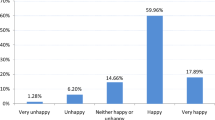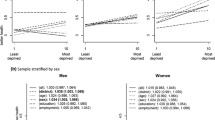Abstract
This paper studies the impact of self-perceived relative income on subjective well-being (SWB) using data from China. The results show that perceiving a lower relative income in comparison with different reference groups leads to lower life satisfaction and happiness. The effect of the self-perceived relative income on SWB is monotonic—the lower the position of an individual in income comparisons, the larger the negative effect. In addition, favorable and unfavorable relative income positions have asymmetric impacts on life satisfaction, but not on happiness. The results hold when controlling for individual fixed effects by utilizing the panel structure of the data.
Similar content being viewed by others
Notes
Pfaff (2013) shows that even a simple change in the measure of the income variable may change the coefficients of the self-constructed relative income on both significance and sign.
In a different setting, a recent study by Nobles et al. (2013) also implements the fixed-effect model to eliminate potential endogeneity that could be caused by unobservable personality traits when investigating the impact of individuals’ self-perceived socioeconomic status on their health conditions.
Totally, 441 observations are dropped when I restrict the sample to respondents who are at least 45 years old. Including these observations in the analyses do not affect the empirical results.
Among all those who report N/A when comparing with schoolmates, 87.5% of them never finish primary school, while all of them do not have a middle school degree. Those respondents who claim to be not applicable to be compared with colleagues are either farmers or unemployed.
Individuals who choose “6. I don’t know” and “7. Not applicable” are dropped in this process.
By doing so, I assume that when the respondents rate their “overall” standard of living, they compare with the five reference groups provided in wave 2013 and these 5 reference groups are equally weighted in the process of comparison.
Only about 1 percent of the respondents consider themselves as having “much better” income than the reference groups. I thus merge the groups of people who perceive “much better” or “a little better” income into a single category. I treat this category has the group of people who perceive better income than the reference groups. This category is the omitted category when estimating Eq. (2).
An ordered probit (logit) model can also be tested because the raw values of the dependent variables of SWB are cardinal. For each value of life satisfaction and happiness, marginal effects can be calculated for the self-perceived relative income dummies. The regression results obtained from ordered probit (logit) models are consistent with those in OLS estimations. The results are provided in the “Appendix.”
Previous studies find that linear fixed effects and fixed-effects logit models give similar results in studying life satisfaction (e.g., Dickerson et al. 2014). I do not conduct fixed-effect (ordered) logit estimation because a logit model would cause a significant drop in the number of observations in our sample due to the fact that for some of the respondents, the outcome variable may display no variation in the two waves of the survey.
I am aware that the “overall” self-perceived relative income I constructed for the 2013 wave may not perfectly match that in the 2011 wave. The reason is that the income comparisons with the 5 reference groups may be not enough to represent the “overall” income comparison. Moreover, the answer choices for the relative income questions in the 2011 and 2013 waves are slightly different. But based on the information available, this way of constructing the overall relative income in the 2013 wave is reasonable.
F test of the differences between the coefficients of different categories is reported in the “Appendix,” panel A of Table 16. Results suggest that there are significant differences between the coefficients of various categories.
Coefficients for age may contain some measurement errors because some of the respondents report their birth year in Lunar calendar while some of them report in Solar calendar.
F test of the differences between the coefficients of different categories are reported in the “Appendix,” Panel B of Table 16.
References
Asadullah, M.Niaz, Saizi **ao, and Emile Yeoh. 2018. Subjective well-being in China, 2005-2010: The role of relative income, gender, and location. China Economic Review 48: 83–101.
Baetschmann, Gregori, Kevin E. Staub, and Rainer Winkelmann. 2015. Consistent estimation of the fixed effects ordered logit model. Journal of the Royal Statistical Society: Series A (Statistics in Society) 178: 685–703.
Blanchflower, David G., and Andrew J. Oswald. 2004. Well-being over time in Britain and the USA. Journal of Public Economics 88: 1359–1386.
Boudreau, Kevin J., Karim R. Lakhani, and Michael Menietti. 2016. Performance responses to competition across skill levels in rank-order tournaments: Field evidence and implications for tournament design. The Rand Journal of Economics 47 (1): 140–165.
Chen, **. 2015. Status concern and relative deprivation in China: Measures, empirical evidence, and economic and policy implications, 9519. No: IZA Discussion Paper.
Cheng, Zhiming, Haining Wang, and Russell Smyth. 2014. Happiness and job satisfaction in Urban China: A comparative study of two generations of migrants and urban locals. Urban Studies 51: 2160–2184.
Clark, Andrew E., Paul Frijters, and Michael A. Shields. 2008. Relative income, happiness, and utility: An explanation for the easterlin paradox and other puzzles. Journal of Economic Literature 46: 95–144.
Clark, Andrew E., and Andrew J. Oswald. 1996. Satisfaction and comparison income. Journal of Public Economics 61: 359–381.
Clark, Andrew E., and Claudia Senik. 2010. Who compares to whom? The anatomy of income comparisons in Europe. The Economic Journal 120 (553): 573–594.
Clark, Andrew E., Claudia Senik, and Katsunori Yamada. 2013. The joneses in Japan: Income comparisons and financial satisfaction, 866. No: ISER Discussion Paper.
Di Tella, Rafael, Robert J. MacCulloch, and Andrew J. Oswald. 2003. The macroeconomics of happiness. The Review of Economics and Statistics 85: 809–827.
Dickerson, Andy, Arne Risa Hole, and Luke A. Munford. 2014. The relationship between well-being and commuting revisited: Does the choice of methodology matter? Regional Science and Urban Economics 49: 321–329.
Diener, Ed, Shigehiro Oishi, and Richard E. Lucas. 2003. Personality, culture, and subjective well-being: emotional and cognitive evaluations of life. Annual Review of Psychology 54: 403–425.
Dumludag, Devrim. 2015. Satisfaction and comparison income in transition and developed economies. International Review of Economics 61: 127–152.
Emmons, Robert A., and Ed Diener. 1985. Personality correlates of subjective well-being. Personality and Social Psychology Bulletin 11: 89–97.
Ferrer-i-Carbonell, Ada. 2005. Income and well-being: An empirical analysis of the comparison income effect. Journal of Public Economics 89: 997–1019.
Ferrer-i-Carbonell, Ada, and Paul Frijters. 2004. How important is methodology for the estimates of the determinants of happiness?”. Economic Journal 114: 641–659.
Goerke, Laszlo, and Markus Pannenberg. 2015. Direct evidence for income comparisons and subjective well-being across reference groups. Economics Letters 137: 95–101.
Hirschman, Albert O., and Michael Rothschild. 1973. The changing tolerance for income inequality in the course of economic development. The Quarterly Journal of Economics 87: 544–566.
Huang, **, Shiyou Wu, and Suo Deng. 2016. Relative income, relative assets, and happiness in Urban China. Social Indicators Research 126: 971–985.
Kahneman, Daniel, and Angus Deaton. 2010. High income improves evaluation of life but not emotional well-being. Proceedings of the National Academy of Sciences of the United States of America 107: 16489–16493.
Kale, Jayant R., Ebru Reis, and Anand Venkateswaran. 2009. Rank-order tournaments and incentive alignment: The effect on firm performance. The Journal of Finance 64: 1479–1512.
Knight, John, and Ramani Gunatilaka. 2010. Great expectations? The subjective well-being of rural-urban migrants in China. World Development 38: 113–124.
Knight, John, and Lina Song. 2009. Subjective well-being and its determinants in rural China. China Economic Review 20: 635–649.
Kushlev, Kostadin, Elizabeth W. Dunn, and Richard E. Lucas. 2015. Higher income is associated with less daily sadness but not more daily happiness. Social Psychological and Personality Science 6: 483–489.
Luttmer, Erzo F.P. 2005. Neighbors as negatives: Relative earnings and well-being. The Quarterly Journal of Economics 120: 963–1002.
Mayraz, Guy, Gert G. Wagner, and Jurgen Schupp. 2009. Life satisfaction and relative income—Perceptions and evidence, 214. NO: SOEPpaper.
McBride, Michael. 2001. Relative-Income effects on subjective well-being in the cross-section. Journal of Economic Behavior & Organization 45: 251–278.
Morin, Pierre. 2006. Rank and health: A conceptual discussion of subjective health and psychological perceptions of social status. Psychotherapy and Politics International 4: 42–54.
Nobles, Jenna, Miranda Ritterman Weintraub, and Nancy E. Adler. 2013. Subjective socioeconomic status and health: Relationships reconsidered. Social Science and Medicine 82: 58–66.
Oshio, Takashi, Kayo Nozaki, and Miki Kobayashi. 2011. Relative income and happiness in asia: evidence from nationwide surveys in China, Japan, and Korea. Social Indicators Research 104: 351–367.
Otis, Nicholas. 2017. Subjective well-being in China: Associations with absolute, relative, and perceived economic circumstances. Social Indicators Research 132: 885–905.
Pfaff, Tobias. 2013. Income comparisons, income adaptation, and life satisfaction: How robust are estimates from survey data?, 555. No: SOEPpaper.
Senik, Claudia. 2009. Direct evidence on income comparisons and their welfare effects. Journal of Economic Behavior & Organization 72: 408–424.
Smyth, Russell, Ingrid Nielsen, and Qingguo Zhai. 2010. Personal well-being in urban China. Social Indicators Research 95: 231–251.
Smyth, Russell, and **aolei Qian. 2008. Inequality and happiness in urban China. Economics Bulletin 4: 1–10.
Wolbring, Tobias, Marc Keuschnigg, and Eva Negele. 2016. Needs, comparisons, and adaptation: The importance of relative income for life satisfaction. European Sociological Review 29: 86–104.
Yu, Han. 2019a. The impact of self-perceived relative income on life satisfaction: Evidence from British panel data. Southern Economic Journal 86: 726–745.
Yu, Han, 2019b. Am I the big fish? The effect of ordinal rank on student academic performance in middle school. Journal of Economic Behavior & Organization (forthcoming).
Author information
Authors and Affiliations
Corresponding author
Additional information
Publisher's Note
Springer Nature remains neutral with regard to jurisdictional claims in published maps and institutional affiliations.
I am grateful to Naci Mocan for numerous suggestions and continuous encouragement. I would like to thank the editors of the Eastern Economic Journal (EEJ), Cynthia Bansak and Allan Zebedee, and anonymous referees at the EEJ for useful comments.
Appendix
Appendix
See Tables 11, 12, 13, 14, 15, 16, 17, 18, 19, 20 and 21.
Rights and permissions
About this article
Cite this article
Yu, H. Income Comparison and Subjective Well-Being: Evidence from Self-Perceived Relative Income Data from China. Eastern Econ J 46, 636–672 (2020). https://doi.org/10.1057/s41302-020-00168-2
Published:
Issue Date:
DOI: https://doi.org/10.1057/s41302-020-00168-2




